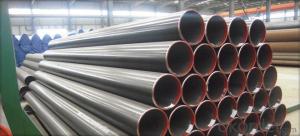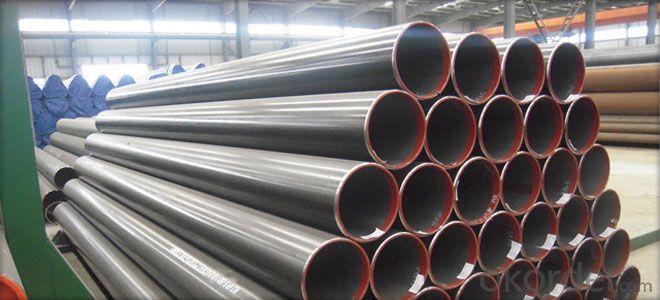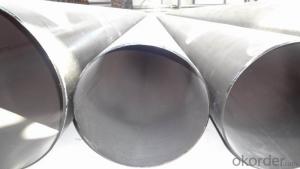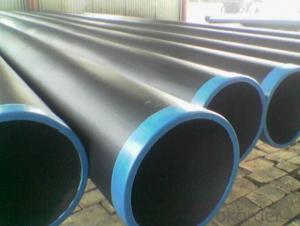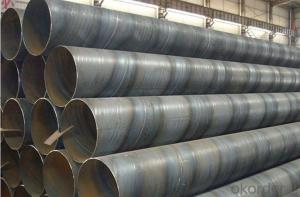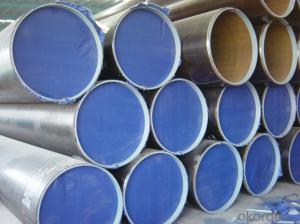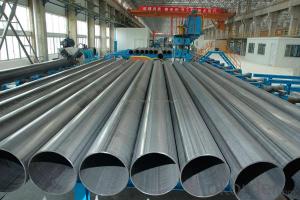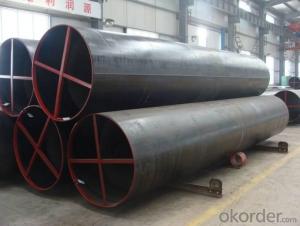X52 LSAW STEEL PIPE
- Loading Port:
- China Main Port
- Payment Terms:
- TT or LC
- Min Order Qty:
- -
- Supply Capability:
- -
OKorder Service Pledge
OKorder Financial Service
You Might Also Like
Product Description:
1、Structure of Welded Steel Tube:
Welded Steel Tube is formed by drawing a solid billet over a piercing rod to create the hollow shell. We are company that have many years experience and professional manager team and engineer team and sales team, sure we will provide you high quality of welded pipe and professioanl service.
2、Main Features of the Welded Steel Tube:
• High manufacturing accuracy
• The higher strength
• The small inertia resistance
• Strong heat dissipation ability
• Good visual effect
• Satisfy price
3、Welded Steel Tube Specification:
Standard | GB, DIN, ASTM ASTM A106-2006, ASTM A53-2007 |
Grade | 10#-45#, 16Mn 10#, 20#, 45#, 16Mn |
Thickness | 8 - 33 mm |
Section Shape | Round |
Outer Diameter | 133 - 219 mm |
Place of Origin | Shandong, China (Mainland) |
Secondary Or Not | Non-secondary |
Application | Hydraulic Pipe |
Technique | Cold Drawn |
Certification | API |
Surface Treatment | factory state or painted black |
Special Pipe | API Pipe |
Alloy Or Not | Non-alloy |
Length | 5-12M |
Outer Diameter | 21.3-610mm |
Grade | 20#, 45#, Q345, API J55, API K55, API L80, API N80, API P110, A53B |
Standard | ASME, ASTM |
1) Material:20#(ASTM A 106/A53 GRB.API5LGRB,GB),45#,16Mn,10#.
2) Specification range:OD:21.3-610mm,WT:6-70mm,length:6-12m or according to the requirement of clients.
3) Excutive standards:GB,ASME API5L.ASTM A 106/A53,Despite of the above standards,we can also supply seamless steel pipe with standard of DIN,JIS,and so on,and also develop new products according to the requirements of our clients!
4) Surface:black lacquered,varnish coating or galvanized.
5) Ends:Beveled or square cut,plastic capped,painted.
6) Packing:bundles wrapped with strong steel strip,seaworthy packing.
4、Packaging & Delivery
Packaging Details: | seaworthy package,bundles wrapped with strong steel strip |
Delivery Detail: | 15-30days after received 30%TT |
5、FAQ of Welded Steel Tube:
①How is the quality of your products?
We have many years business experience in this area, and we have professional engineer and manager team and sure we can provide you high quality production and professional service.
②How about price?
Yes, we are factory and be able to give you lowest price below market one, and we have a policy that “ for saving time and absolutely honest business attitude, we quote as lowest as possible for any customer, and discount can be given according to quantity”,if you like bargain and factory price is not low enough as you think, just don’t waste your time.Please trust the quotation we would give you, it is professional one.
③Why should you chose us?
Our service formula: good quality+good price+good service=customer’s trust
SGS test is available, customer inspection before shipping is welcome, third party inspection is no problem.
6、 Welded Steel Tube Images:
- Q: What is the dimensional stability of steel pipes?
- The ability of steel pipes to retain their shape and dimensions in different conditions and external forces is referred to as dimensional stability. Steel pipes are well-known for their exceptional dimensional stability due to the inherent properties of the material. Steel, being a strong and rigid material, can maintain its shape even when subjected to high pressure or temperature fluctuations. This characteristic makes steel pipes highly suitable for applications that demand stability and resistance to deformation, such as plumbing, oil and gas pipelines, and structural supports. In addition to its inherent strength, the dimensional stability of steel pipes is also a result of their manufacturing processes. These pipes are typically produced using methods like seamless or welded construction, ensuring uniformity and consistent dimensions throughout the pipe's length. This precise manufacturing contributes to the dimensional stability of steel pipes. Furthermore, steel pipes are often coated with various protective coatings to increase their resistance to environmental factors. These coatings, such as galvanization or epoxy coatings, not only provide corrosion protection but also enhance the dimensional stability of the pipes by adding an extra layer of strength and durability. In conclusion, the widespread use of steel pipes in different industries is largely attributed to their dimensional stability. Their ability to maintain their shape and dimensions, even in challenging conditions, guarantees reliable and long-lasting performance in various applications.
- Q: What are the different testing methods for steel pipes?
- Some of the different testing methods for steel pipes include non-destructive testing methods such as ultrasonic testing, magnetic particle testing, and radiographic testing. These methods are used to detect any defects or inconsistencies in the pipe's structure or material without causing any damage. Other testing methods include hydrostatic testing, which involves pressurizing the pipe with water to check for leaks or weaknesses, and mechanical testing, which measures the pipe's strength and durability through tensile, hardness, and impact tests.
- Q: Are steel pipes suitable for underground chemical transport?
- Steel pipes are generally considered suitable for underground chemical transport due to their high strength and durability. Steel pipes can withstand the pressure and weight of the soil above them, making them resistant to damage or collapse. Additionally, steel pipes are corrosion-resistant, which is crucial when transporting chemicals that may react with or corrode other materials. They are also able to handle a wide range of temperatures, making them suitable for transporting chemicals that may require specific temperature conditions. However, it is important to consider the specific chemical being transported and consult with experts in chemical engineering or pipeline design to ensure that the steel pipes are compatible with the chemical and that any necessary safety measures are in place.
- Q: What are the different methods of cleaning steel pipes?
- There are several methods for cleaning steel pipes, including mechanical cleaning, chemical cleaning, and high-pressure water jetting.
- Q: Can steel pipes be used for hydropower generation?
- Yes, steel pipes can be used for hydropower generation. Steel pipes are often used in the construction of hydroelectric power plants to transport water from a higher elevation to lower areas, where the water's kinetic energy is converted into mechanical energy to generate electricity. The durability and strength of steel pipes make them suitable for this purpose, as they can withstand the high pressure and flow rates of water in hydropower systems.
- Q: What are the different types of steel pipe joints?
- There are several different types of steel pipe joints, including threaded, welded, flanged, grooved, and compression joints.
- Q: Hot galvanized steel pipe for use?
- Hot galvanized pipe: in order to improve the corrosion resistance of steel pipe, galvanized steel pipe. Galvanized steel pipe hot galvanized and galvanized two kinds, hot galvanized, zinc coating thickness, zinc plating cost is low, the surface is not very smooth.The hot-dip galvanized pipe is an alloy layer that causes molten metal to react with the iron matrix, thus combining the substrate with the two coating. Hot dip galvanizing is the first steel pickling, in order to remove iron, steel pipe surface after pickling, cleaning by ammonium chloride or zinc chloride solution or ammonium chloride and zinc chloride aqueous solution tank, and then into the hot dip tank. Hot galvanizing has the advantages of uniform coating, strong adhesion, long service life and so on. A complex physical and chemical reaction is formed between the steel tube matrix and the molten plating solution to form a corrosion resistant structure with a tight zinc - iron alloy layer. The alloy layer is integrated with the pure zinc layer and the steel pipe matrix. Therefore, it has strong corrosion resistance.
- Q: What is the role of steel pipes in the chemical manufacturing industry?
- Steel pipes are an essential component in the chemical manufacturing industry as they are used for various purposes such as transporting chemicals, gases, and liquids safely and efficiently. They provide a durable and corrosion-resistant infrastructure, ensuring the integrity of the chemical processes. Steel pipes also play a crucial role in maintaining the overall safety and reliability of the manufacturing operations.
- Q: What does carbon seamless steel pipe mean? What is the difference between a seamless 20# and an ordinary one? What is it used in detail?
- In general, steel is divided into two groups according to their chemical composition: carbon steel and alloy steel;(1): carbon steel low carbon steel (C = 0.25%); carbon steel (0.25% < C < 0.60%); high carbon steel (C = 0.60%)(2): alloy steel, low alloy steel (alloy is less than or equal to 5%); in steel (5% < < 10% alloy; high alloy steel (alloy) = 10%)Carbon seamless steel tubes are mostly pipes for mechanical engineering structures and pipes for conveying fluids.
Send your message to us
X52 LSAW STEEL PIPE
- Loading Port:
- China Main Port
- Payment Terms:
- TT or LC
- Min Order Qty:
- -
- Supply Capability:
- -
OKorder Service Pledge
OKorder Financial Service
Similar products
Hot products
Hot Searches
Related keywords
